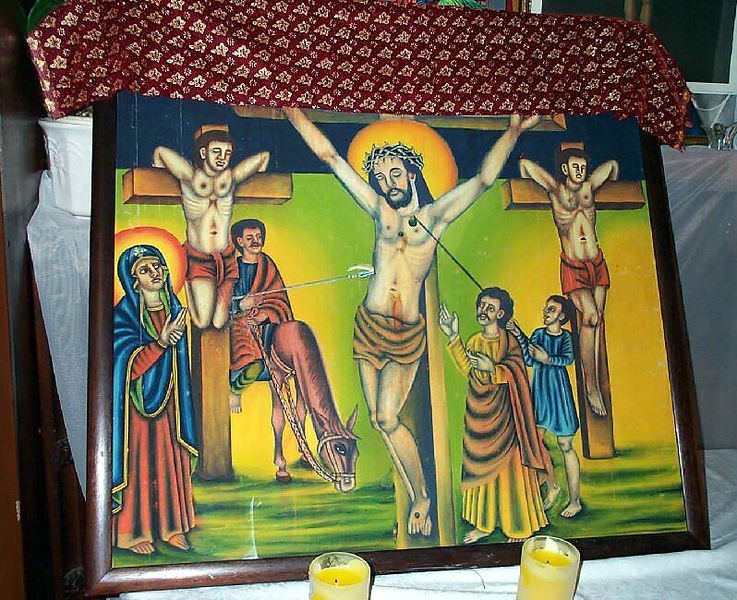Ethiopians Mark Easter amidst Challenges - ENA English
Ethiopians Mark Easter amidst Challenges

Ethiopian Christians stuck to the centuries-old religious tradition of celebrating the resurrection of Jesus Christ amidst of the pandemic causing so much pain and suffering coupled with volatility.
FasikaaGe'ez word for Easter comes from the Greek Pascha also known as Tinsay, meaning resurrections in Amharic. The 55 days lent season is marked among the faithful of the Ethiopian Orthodox Tewahedo Church since the 4th century A.D.
Fasika, however, takes place in all the Christian Churches throughout the country, whether be it Orthodox, Catholic, or Protestant, and follows the eastern method of calculating Easter thus tending to fall after Easter in the Western calendar (some years both fall on the same date).
Fasika is a much more important festival than Christmas, since the Death and Resurrection of Jesus is more significant in Orthodox and Ethiopian Evangelical theology than his birth. Jesus' crucifixion which led to his death on a Friday, according to Orthodox thought was for the purpose of fulfilling the word of God, and led to the conquest of death and Jesus' resurrection from the tomb after three days, the third day being the Sunday when Ethiopian Easter is celebrated.
Among the Ethiopian Orthodox Tewahedo Church, the whole week before the end of the lent season leading to Sunday on which the fasting season ends is marked with different incidents leading to the crucifixion and the resurrections of Jesus Christ.
Monday was the day on which Jesus cursed the fig tree which has miraculously dried up as it had no fruit on it. Tuesday was the day on which the Pharisees and the Sadducees questioned Jesus by what sort of power he was doing all the miracles and is known as the Day of Questioning.
On Wednesday, the Pharisees started a plot on how they can capture and kill Jesus and the Day was remembered as the Day of Plotting. Thursday was a commemorative day for Jewish Passover Feast on which Jesus washed the legs of his disciples in lieu of teaching them the importance humility.
Friday is marked as Good Friday on which Jesus was captured and crucified by the Jews. Saturday marks Jesus resting in his tomb and Sunday is the day marking the resurrection of Jesus from death. A week from this Sunday Hosannaor Palm Sunday was marked as the triumphant entry of Jesus Christ into Jerusalem.
The Orthodox Christians pray at church by prostrating themselves in church, bowing down and rising upon the average for 10 times or until they get tired.
The main religious service takes place with the Paschal Vigil on Saturday night. It is a somber, sacred occasion with music and dancing until the early hours of the morning. At 3:00 a.m. everyone returns home to break their fast, and a chicken is slaughtered at midnight for the symbolic occasion.
In the morning, after a rest, a sheep is slaughtered to start the feasting on Easter Sunday. While Catholics and Protestant denominations have special Easter Services/Masses bringing in people from various smaller community churches together to participate in an Easter sermon and celebration.
Easter in Ethiopia and its diaspora communities, is a day when people celebrate the occasion by preparing and eating raw meat, chicken stew known as doro-wot, sheep or goat meat often have with locally brewed mead from fresh honey known as tej, and home brewed beer known as tella.
Easter is also celebrated in the spirit of compassion for the poor and the aged who cannot under normal conditions prepare food and drinks to end the lent season.
Ethiopia now marks the second Fasika after the advent of the COVID-19 pandemic in the country. Besides, political ramifications surrounding the 80 percent completion of the construction of GERD and the multifaceted conspiracies that are being waged by Egypt and Sudan as well as the consortiums of international media, relief and rehabilitation needs in Tigray, Metekel and several other areas of the country depicts the setting under which Christians celebrate this year’s Easter.
Ethnic based conflicts and multiple sets of sabotages on the political order in the country makes it very difficult for Christians in some areas of the country to celebrate the occasion in peaceful and tranquil manner.
What’s more, Ethiopian Christians celebrate Easter under the conditions of the escalation of the spread of COVID-19 with its multifarious economic, social and socio-psychological effects.
A week back the Inter-religious Council of Ethiopia marked three days of benediction and prayer at the national level for peace and unity in the country.
Despite a number of inconveniences and restrictions set as part of the prevention and control of COVID-19 in the country, Ethiopian Christians are already celebrating Fasika with all the necessary Christian requirements and culturally acceptable festivities. People are praying and hoping next year COVID-19 to end and everyone remains safe.